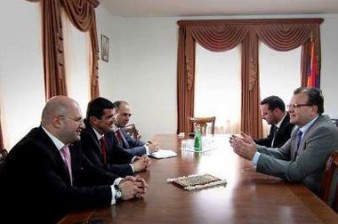
29/05/2015 20:00
Austrian politician observing elections in NKR says Azerbaijan's threats are not serious
Politician from Austrian Liberal Party Hans-Joerg Jenewein is committed to the self-determination of nations. He offered his services as an observer in the parliamentary elections in Nagorno Karabakh, Manuel Ochsenreiter, who accompanied the politician during the mission, writes in his blog “manuelochsenreiter.com.”
Manuel Ochsenreiter writes about the elections and his impressions. Jenewein is one of about a hundred international parliamentary election observers in Nagorno Karabakh. Usually, such tasks are undertaken by the OSCE. But increasingly, the international organization refuses to observe elections and referendums. The OSCE provided a group of observers neither during the referendum in Crimea in March 2014 nor the parliamentary and presidential elections of the self-declared republics of Donetsk and Lugansk in November 2014. Those unrecognized state formations are increasingly helping themselves by inviting observers independent of the OSCE - mostly parliamentarians, journalists and political analysts. These election observers then strictly follow the procedure of the OSCE.
According to Hans-Joerg Jenewein, in the end it is about helping a small country in its democratic development and in exercising self-determination. The blog also reads that prior to the parliamentary elections, Azerbaijan announced their plans to open "criminal proceedings" against the international election observers in Nagorno Karabakh. Jenewein shakes his head in the face of such threats. "Whosoever considers democratic elections a threat should think even more seriously about where he actually stands politically," Jenewein said.
There have been international negotiations on the status of the small area since more than 20 years - so far without any significant results. Armenia and Azerbaijan are also directly involved in these negotiations. According to the journalist, if Armenia officially recognizes the Republic of Nagorno Karabakh, it would be regarded as the end of the negotiations. The result could mean war.
The leader of the Austrian Liberal Party Hans-Joerg Jenewein caused a lot of anger in Turkey by his position about Armenian Genocide perpetrated by the Ottoman Turks. Turkish President Recep Tayyip Erdogan swaggered from Ankara that he now plans "sanctions" against Austria. In Turkey, it is forbidden to describe the massacre of the Armenian population, during which an estimated 1.5 million people perished, as "genocide." "One cannot expect something else from the leadership in Ankara," Jenewein says diplomatically. The tone suggests that Erdogan does not enjoy very much his respect.
According to Manuel Ochsenreiter, the journalist, Jenewein’s task was to check if everything was running properly. This specifically means to critically examine whether the elections are as free, equal and secret. Therefore, he must speak with all those responsible, check the ballot boxes and their seals, see the electoral lists and talk to voters. A total of about 100,000 citizens are eligible to vote. Nagorno-Karabakh comprises around 150,000 inhabitants.
Ochsenreiter writes that the politician was satisfied with the elections having the impression that the people are doing everything accurately. Ochsenreiter says that the parliamentary election is an important event in Nagorno Karabakh. It is not only about electing a new parliament, but also about presenting themselves to the world as an absolutely normal, democratic country. The journalist also notes that although everything runs in a peaceful and orderly manner, they are constantly reminded of the difficult situation of the small country.
“The War of Independence between Nagorno-Karabakh and Azerbaijan lasted more than six years. At the time when the Soviet Union was only a rotten structure, protests broke out in February 1988 in Nagorno-Karabakh, then a province within the Azerbaijani Soviet Republic, and declared itself independent from Azerbaijan. A meeting of representatives of the people of Nagorno-Karabakh called for unification with Armenia. During the war of independence, there was an Azerbaijani military garrison wherefrom Grad rockets were being fired at Stepanakert by the Azerbaijani Armed Forces from the small town of Shushi. On 8 May 1992, the Armenians launched an offensive and took Shushi the following day. The city lay in ruins; the Azerbaijanis had desecrated the Armenian Cathedral Ghazanchetsots turning it into a weapons and explosives storage warehouse. Immediately, the Armenians set about to remove the mounted Grad rockets from the house of God. In 1998 the reconstruction of the cathedral was completed,” the author writes and adds that Azerbaijan got the support of Turkey, which has always regarded the Azerbaijanis as "brothers."
“Even mercenaries and jihadists from around the world rushed to Azerbaijan to help in fighting Armenia. On the Azerbaijani side of the frontline Islamist Chechens, Afghans and the Turkish "Grey Wolves" roamed. Arms shipments to Baku came among others from Ukraine and Israel. On 12 May 1994, a cease-fire agreement came into force,” Ochsenreiter says. The website reads that Hans-Joerg Jenewein is at every step conscious that he is located in a geopolitical cauldron; it leaves the Austrian politician in no doubt. "It is therefore all the more important that we help the people here. The mutual dialogue on an equal footing and based on mutual respect is the only way to bring peace to the region. Every democratic initiative, especially the parliamentary elections, is a step towards normalization and democratization. Every European must have an interest in that,” he says.








